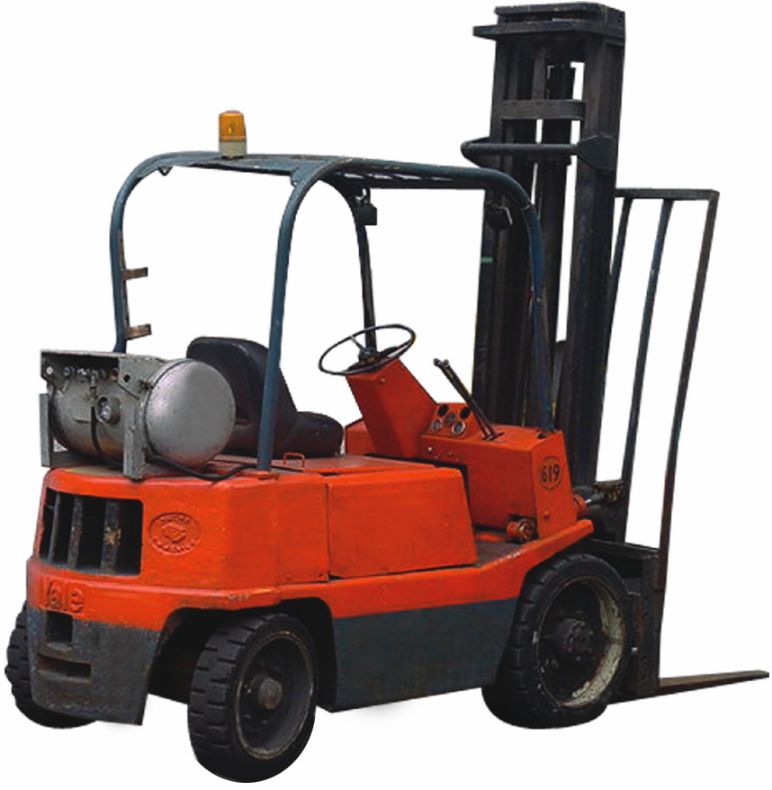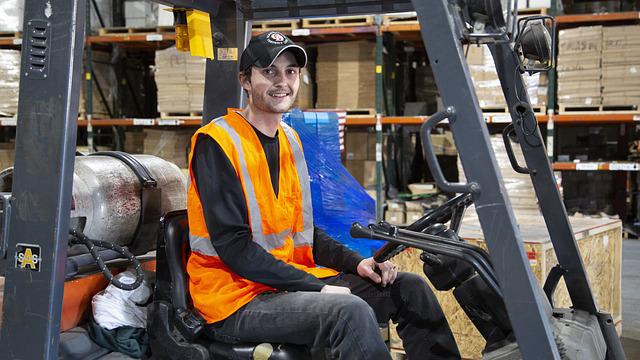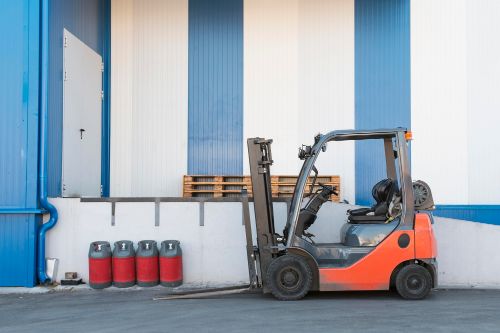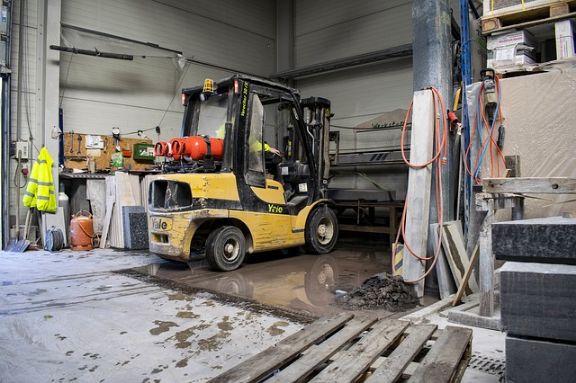
Do you still use an old model propane-powered forklift in your facility? Chances are the tank installed to it is also old and may require inspection. The inspection is necessary to keep the safety of the operator and the condition of the equipment.
Is the forklift tank inspection requirement mandatory? If so, where does the law on this subject exist for everyone to follow? Well, the specific regulation on this specific matter is 49 CFR § 173.301(a)(2). This states the requirement for visual inspection of the cylinder prior to refilling. Any damage, such as the ones mentioned below, will render the cylinder subject to requalification and should not, therefore, be refilled or transported.
While NFPA 58 chapter 4-2.4, clearly mentioned the requirement for an inspection. The connecting hose should be visually inspected for propane leaks or physical damage. Any defect found in the hose should be repaired or replaced.
The best way to inspect a forklift propane tank is to have an experienced technician do it for you. They will be able to tell if there are any signs of flaws and defects in the tank. If you’re not sure how to go about this, then you should contact your supplier or manufacturer for more information.
Although an operator or a worker can perform a visual inspection before every use of the forklift to make sure there are no leaks or cracks in the tank, it is still advisable to have trained personnel do the inspection especially when there is a large number of cylinders being used in the facility.
Contact a dealer or manufacturer in your area to request, that they have a professional inspector who can assist you in this undertaking. Have your tanks inspected and have peace of mind.
Why Specific Inspection Requirements are Crucial for You
When dealing with forklifts powered by propane, it’s essential for you to understand the importance of detailed inspection protocols. Here’s why these in-depth checks matter to you:
- Safety implications of using compromised propane tanks: Propane is a highly flammable gas. If you’re using a damaged or compromised tank, you’re exposing yourself and those around you to potential leaks, increasing the risks of fires or explosions. These can lead to personal injuries, damage to property, and major interruptions in your operations.
- Impact on the operational efficiency and longevity of your forklift: A subpar propane tank can directly affect how your forklift performs. Issues like inconsistent gas flow or impurities can cause your forklift to run unevenly, lack power, or wear out faster. This not only disrupts your daily tasks but could also mean you’ll be spending more on maintenance and possibly even replacing your equipment sooner than expected.
- Legal and financial consequences of not following guidelines: There are established standards you need to adhere to for the sake of workplace safety. If you overlook these, you might find yourself facing hefty fines, legal actions, or even potential lawsuits if accidents occur. Moreover, if an accident happens because of a poorly maintained tank, your insurance might not cover it, putting an additional financial strain on you.
Your Checklist for External Inspection
When you’re inspecting the exterior of a propane tank, there are key areas you should focus on:
- Check for obvious damages like dents, corrosion, or cuts: Any sign of damage could mean your tank’s structural integrity is at risk. For instance, if you spot a dent, it could indicate that the tank has suffered an impact, which might also affect its internal components. Corrosion, if not addressed, can weaken the tank, leading to potential leaks.
- Examine the cylinder collar for clarity and intactness: This collar provides vital details like when the tank was made, its capacity, and when it needs requalification. It’s crucial for you to ensure this information is legible, so you can make informed decisions about its usage and maintenance.
- Verify the condition of the safety relief device: This is your tank’s defense against excessive pressure. Make sure it’s free from damage, corrosion, or blockages. If this device fails, the tank could dangerously over-pressurize, posing a serious risk to you.
- Inspect the foot ring for any noticeable damage: The foot ring keeps your propane tank standing securely. Any damage or deformities can make the tank unstable, which could lead to it falling over or leaking.
By grasping the importance of these specific inspection requirements and knowing what to look for, you can ensure a safer working environment, better performance from your forklift, and compliance with all the necessary regulations.
Your Guide to Internal Inspection Criteria
When it comes to the safety and efficiency of your propane-powered forklift, external inspections alone won’t cut it. The internal health of your propane tank is just as critical. Here’s what you should be on the lookout for when conducting an internal inspection:
- Search for signs of rust, pitting, or other internal damages: Just like external damages can compromise the tank’s integrity, so can internal issues. If you find rust or pitting, it indicates that the tank has started corroding from the inside. Such damages can weaken the tank’s structure and make it unsafe for use. Ensure you routinely inspect for these signs to catch potential problems early on.
- Examine the valve system for proper operation: The valve system plays a pivotal role in controlling the flow of propane. If it’s not working as it should, you might experience inconsistencies in your forklift’s operation, or even worse, dangerous leaks. When you’re inspecting, ensure that the valves open and close smoothly and seal properly when shut.
- Ensure there are no foreign materials or contaminants inside: Foreign materials or contaminants can affect the purity of the propane and, in turn, the efficiency of your forklift’s engine. When inspecting, make sure there’s no debris, water, or other contaminants present. These impurities can not only hinder performance but also lead to more significant issues, such as clogs or equipment malfunctions.
Timeline and Documentation Requirements
Managing propane tanks isn’t just about the physical checks. It’s also essential to be on top of the timelines for inspections and have a system in place for documentation. Here’s what you need to know:
Timeline Requirements
- Frequency of inspections: Regular and mandated intervals: It’s not enough to inspect your tank when you remember or when it seems necessary. You should conduct regular inspections at intervals recommended by the manufacturer or as per industry standards. Moreover, there might be mandated inspection intervals set by regulatory bodies in your region. Ensure you’re aware of and adhere to these schedules to ensure the safety and compliance of your equipment.
- When to retire or requalify a tank: Understanding tank lifespan: Every propane tank has a lifespan beyond which it’s not considered safe for use. Familiarize yourself with the manufacturing date and the requalification details, usually found on the tank’s collar. This information will guide you on when to retire a tank or when it’s due for requalification. Remember, using a tank beyond its recommended lifespan can pose serious safety risks.
Proper Documentation
- Importance of maintaining inspection records: Keeping detailed records of all your inspections is not just a good practice; it’s often a legal requirement. Maintaining these records ensures that you have a historical account of the tank’s condition, which can be invaluable in case of discrepancies, insurance claims, or audits.
- Elements to include in an inspection report: An inspection report should be thorough. Key elements to include are:
- Date of inspection.
- Name of the inspector.
- Physical condition of the tank (both internal and external).
- Operational status of the valve system.
- Any signs of rust, pitting, or other damages.
- Recommendations for repairs, requalification, or retirement.
- Any other observations or issues identified during the inspection.
- Legal requirements regarding documentation: Depending on where you operate, there will be specific legal mandates about how long you should retain inspection records, what they must contain, and how they should be presented in case of audits or checks by authorities. Make sure you’re well-versed in these requirements to avoid any legal complications.
By staying on top of the timeline and documentation requirements, you ensure that your operations remain safe, efficient, and compliant. It’s a proactive approach that can save you time, money, and potential legal hassles in the long run.
Handling and Storing Propane Tanks
Handling and storing propane tanks requires a specific set of guidelines to ensure safety and longevity. Moreover, after inspections, it’s vital to know the appropriate steps to take, based on the inspection outcomes. Here’s a guide to help you navigate these procedures:
Handling and Storing Propane Tanks
- Proper lifting techniques to prevent damage: Propane tanks, especially when full, can be quite heavy. When lifting:
- Always use both hands and bend at your knees, not your waist.
- Ensure the tank is securely gripped, preferably at the base, to avoid dropping.
- Never drag, roll, or slide the tanks, as this can lead to external damages or even leaks.
- Recommendations for safe storage:
- Ventilation: Always store propane tanks in well-ventilated areas. This ensures that in the unlikely event of a minor leak, the gas can disperse, reducing the risk of a fire or explosion.
- Temperature considerations: Propane tanks should be kept in a cool, shaded place, away from direct sunlight or extreme temperatures. Excessive heat can increase the pressure inside the tank, posing a risk.
- Orientation: Store cylinders upright to ensure the safety valve functions correctly.
- Away from Ignition Sources: Ensure propane tanks are stored away from open flames, electrical equipment, or any potential ignition source.
- Limit indoor storage: It’s advisable to store propane tanks outside. If indoor storage is the only option, ensure the area is well-ventilated and adhere to local regulations concerning quantity limits.
Action Steps After Inspection
- Procedures for tanks that fail inspection:
- Isolate and mark the tank: Ensure that any tank that fails inspection is clearly marked and kept away from the operational area.
- Notify relevant authorities or suppliers: Depending on your region, you may need to inform certain bodies about non-compliant tanks.
- Safe disposal methods for irreparable tanks:
- Never throw away old or damaged tanks in the regular trash or recycling bins.
- Contact local hazardous waste disposal facilities or propane suppliers for guidance on proper disposal methods.
- Ensure valves are closed, and, if possible, the tank is empty before disposal.
- Requalification processes for tanks that can be reused:
- Propane tanks that are nearing the end of their lifespan or have minor issues might be eligible for requalification.
- This process involves testing the integrity and safety of the tank and, if it passes, it can be recertified for extended use.
- Ensure you work with certified professionals for the requalification process.
With this knowledge, you can handle, store, and decide on post-inspection steps for your propane tanks confidently, ensuring safety and compliance at every stage.
Best Practices When Inspecting Propane Tanks
- Prior to refilling, the recertification date must be checked. Omitting to check the recertification date is common for workers performing the inspection. If you’re the one responsible for this activity, have an inspection checklist. Any tanks that are passed or due for recertification should not be refilled.
- Regular monitoring of the propane tanks is a good practice to perform by the business owner. What is going to be monitored? Things such as the condition of the tank, recertification date, rebuild or repair date, on what vehicle it is installed, and other information that may be deemed necessary for the monitoring.
- Label each tank of the gas it contains. This is to ensure that easy identification can be done prior to the use of the cylinder. This item is only applicable when there are a number of types of gas used on the job site and not only propane.
- Remove any paper or plastic sticker attached to the shell this may hide flaws and defects that may not be visible to the eyes.
- Requalification and recertification must only be done by a trained professional or in a DOT-authorized facility before the cylinder can be put back to service. No person untrained in this matter is allowed to do the recertification.
- If “XXX” is found above the DOT number during an inspection on the collar, bottom ring, or in the shell of the tank, or there is a “condemned” mark, put the cylinders with those marks out of service.
- Valves and hoses should also be inspected before refilling. Valves have soft parts made of nylon or rubber that can become brittle over time, propane liquid or vapor can leak and create dangerous situations.
Common Mistakes in the Process of Getting a Forklift Propane Tank Inspection Done
- Not getting tanks inspected at all – some people omit while others commit. If you do not get your forklift propane tanks inspected, you are risking serious injury to yourself or your workers. Getting them inspected will enable you to determine if the tanks are safe for use and require disposal.
- Not hiring a professionally-trained inspector to do the inspection – a professional inspector will be able to check for any defects, leaks, corrosion, dents, and other damage that could potentially cause an explosion or fire. The inspector can also verify if there are any problems with the valve or pressure relief device that might cause an unsafe release of propane gas.
- Not scheduling an appointment with the inspector – the inspector needs to know when they can come and inspect your forklift propane tanks in your facility. Schedule the inspection in advance. The inspection is going to take a long time, so it is important that you inform the inspector in advance.
- Contracting a company that doesn’t have a DOT-approved facility or hiring a professional who doesn’t have experience in inspecting propane tanks. Don’t base your judgment on the inspection cost rather look at the reputation of the company instead.
To Make a Finalization
Throughout this guide, you’ve delved into the intricate details of propane tank inspections, handling, and storage. It’s evident that adhering to these specific inspection requirements is not merely a checklist to tick off. For you, it’s a commitment to the safety, efficiency, and longevity of your operations.
Think about it: every step you take, from inspecting the internal elements of a tank to properly documenting your findings, plays a pivotal role in ensuring your workplace remains hazard-free and efficient. By cutting corners or missing out on these procedures, you’re not just risking equipment damage – you’re potentially compromising the safety of everyone around.
So, as you integrate these practices into your routine, remember to always put safety and compliance at the forefront. It’s a reflection of your dedication not just to maintaining equipment, but to creating an environment where everyone can work confidently, knowing they’re protected. Keep this knowledge close, act diligently, and always prioritize safety in all you do.

Mike is an experienced propane technician with over 15 years of professional experience in the field. He has dedicated his career to helping customers with their propane needs, from installation to maintenance and repair. Together with Jeremy, he co-founded this website to provide useful information and guidance to customers seeking reliable propane services.



